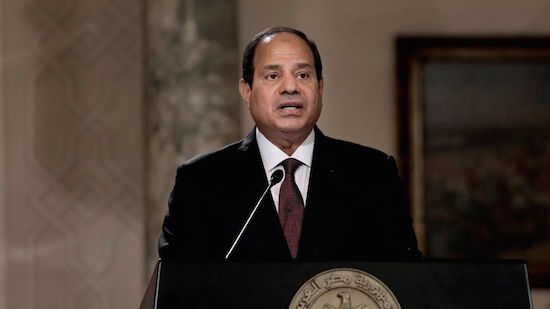Egypt blasted the EU and Britain on Saturday for criticizing a recent court decision to freeze the assets of three rights activists, accusing both of double standards, telling them to mind their own business, and demanding that it be left alone to pursue its goal of becoming a "modern" state.
An Egyptian court on Wednesday ruled to freeze the assets of three rights activists, including a prominent women's rights campaigner, Mozn Hassan. It's the latest chapter in a widening crackdown against civil society groups that includes travel bans and a recent law that gives security agencies extensive powers over their work.
The activists' asset freezes, as well as those of five other rights campaigners in September, are part of a wider case against at least 12 rights groups that dates back to 2011, but which was revived in 2015.
A sharply-worded statement by the Egyptian Foreign Ministry said the comments by the EU and Britain amounted to "flagrant" interference in the country's affairs. It also rejected the role of unnamed "parties" — presumably Britain and the EU — that give themselves the right to judge other nations.
"They had better turn their attention to their internal affairs and the social and political deficiencies that cannot be hidden and leave the Egyptian state to continue its steady march toward laying the foundations of a modern civil state built on the supremacy of the law, respect for the judiciary and its rulings, safeguarding the interests of citizens and bolstering the security of society."
An EU spokesperson on Thursday said the court verdict represented a "worrying trend of restricting space for civil society to operate in Egypt," arguing that rights activists and an active civil society play a key role in democratic and economic development, helping build political stability.
A British Foreign Office minister, Tobias Ellwood, said the following day that he was "deeply concerned" by the verdict. "I encourage Egypt to lift restrictions on civil society organizations, and allow them to operate freely in line with the constitution," he said in a statement.
Elected in 2014, Egypt's general-turned-president Abdel-Fattah el-Sissi has overseen a crackdown that has jailed thousands, mostly Islamists but also some prominent secular activists. Authorities have meanwhile steadily eroded many of the freedoms won by a 2011 popular uprising that toppled longtime autocrat Hosni Mubarak.
Draconian restrictions have also been placed on holding street protests, outspoken TV hosts removed and critics subjected to character assassination by pro-government media figures. Meanwhile, pro-democracy and rights activists have been demonized as foreign agents or accused of links to the now-banned Muslim Brotherhood group.
A new constitution ratified in a 2014 referendum is widely seen as the most liberal and progressive in the country's history, but its guarantees for freedoms, privacy and human rights have largely been ignored.
El-Sissi has repeatedly said that Egypt should not be judged by Western standards and that the right to education, housing and health care is just as important as freedom of expression. Since his election, he has focused on reviving Egypt's ailing economy, upgrading its rickety infrastructure and battling Islamic State militants in the Sinai Peninsula.
Criticism of Wednesday's court verdict coincided with a scathing report by Human Rights Watch on Egypt's human rights record in 2016. The New York-based advocacy group accused authorities of banning public criticism of the government and said security forces have forcefully disappeared hundreds of people and routinely tortured detainees.



